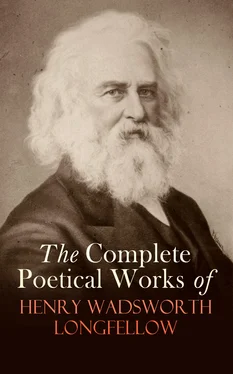There the richest was poor, and the poorest lived in abundance.
Somewhat apart from the village, and nearer the Basin of Minas,
Benedict Bellefontaine, the wealthiest farmer of Grand-Pre,
Dwelt on his goodly acres: and with him, directing his household,
Gentle Evangeline lived, his child, and the pride of the village.
Stalworth and stately in form was the man of seventy winters;
Hearty and hale was he, an oak that is covered with snow-flakes;
White as the snow were his locks, and his cheeks as brown as the oak-leaves.
Fair was she to behold, that maiden of seventeen summers.
Black were her eyes as the berry that grows on the thorn by the wayside,
Black, yet how softly they gleamed beneath the brown shade of her tresses!
Sweet was her breath as the breath of kine that feed in the meadows.
When in the harvest heat she bore to the reapers at noontide
Flagons of home-brewed ale, ah! fair in sooth was the maiden,
Fairer was she when, on Sunday morn, while the bell from its turret
Sprinkled with holy sounds the air, as the priest with his hyssop
Sprinkles the congregation, and scatters blessings upon them,
Down the long street she passed, with her chaplet of beads and her missal,
Wearing her Norman cap and her kirtle of blue, and the ear-rings,
Brought in the olden time from France, and since, as an heirloom,
Handed down from mother to child, through long generations.
But a celestial brightness—a more ethereal beauty—
Shone on her face and encircled her form, when, after confession,
Homeward serenely she walked with God's benediction upon her.
When she had passed, it seemed like the ceasing of exquisite music.
Firmly builded with rafters of oak, the house of the farmer
Stood on the side of a hill commanding the sea; and a shady
Sycamore grew by the door, with a woodbine wreathing around it.
Rudely carved was the porch, with seats beneath; and a footpath
Led through an orchard wide, and disappeared in the meadow.
Under the sycamore-tree were hives overhung by a penthouse,
Such as the traveller sees in regions remote by the roadside,
Built o'er a box for the poor, or the blessed image of Mary.
Farther down, on the slope of the hill, was the well with its moss-grown
Bucket, fastened with iron, and near it a trough for the horses.
Shielding the house from storms, on the north, were the barns and the farm-yard,
There stood the broad-wheeled wains and the antique ploughs and the harrows;
There were the folds for the sheep; and there, in his feathered seraglio,
Strutted the lordly turkey, and crowed the cock, with the selfsame
Voice that in ages of old had startled the penitent Peter.
Bursting with hay were the barns, themselves a village. In each one
Far o'er the gable projected a roof of thatch; and a staircase,
Under the sheltering eaves, led up to the odorous corn-loft.
There too the dove-cot stood, with its meek and innocent inmates
Murmuring ever of love; while above in the variant breezes
Numberless noisy weathercocks rattled and sang of mutation.
Thus, at peace with God and the world, the farmer of Grand-Pre
Lived on his sunny farm, and Evangeline governed his household.
Many a youth, as he knelt in the church and opened his missal,
Fixed his eyes upon her as the saint of his deepest devotion;
Happy was he who might touch her hand or the hem of her garment!
Many a suitor came to her door, by the darkness befriended,
And, as he knocked and waited to hear the sound of her footsteps,
Knew not which beat the louder, his heart or the knocker of iron;
Or at the joyous feast of the Patron Saint of the village,
Bolder grew, and pressed her hand in the dance as he whispered
Hurried words of love, that seemed a part of the music.
But, among all who came, young Gabriel only was welcome;
Gabriel Lajeunesse, the son of Basil the blacksmith,
Who was a mighty man in the village, and honored of all men;
For, since the birth of time, throughout all ages and nations,
Has the craft of the smith been held in repute by the people.
Basil was Benedict's friend. Their children from earliest childhood
Grew up together as brother and sister; and Father Felician,
Priest and pedagogue both in the village, had taught them their letters
Out of the selfsame book, with the hymns of the church and the plain-song.
But when the hymn was sung, and the daily lesson completed,
Swiftly they hurried away to the forge of Basil the blacksmith.
There at the door they stood, with wondering eyes to behold him
Take in his leathern lap the hoof of the horse as a plaything,
Nailing the shoe in its place; while near him the tire of the cart-wheel
Lay like a fiery snake, coiled round in a circle of cinders.
Oft on autumnal eves, when without in the gathering darkness
Bursting with light seemed the smithy, through every cranny and crevice,
Warm by the forge within they watched the laboring bellows,
And as its panting ceased, and the sparks expired in the ashes,
Merrily laughed, and said they were nuns going into the chapel.
Oft on sledges in winter, as swift as the swoop of the eagle,
Down the hillside hounding, they glided away o'er the meadow.
Oft in the barns they climbed to the populous nests on the rafters,
Seeking with eager eyes that wondrous stone, which the swallow
Brings from the shore of the sea to restore the sight of its fledglings;
Lucky was he who found that stone in the nest of the swallow!
Thus passed a few swift years, and they no longer were children.
He was a valiant youth, and his face, like the face of the morning,
Gladdened the earth with its light, and ripened thought into action.
She was a woman now, with the heart and hopes of a woman.
"Sunshine of Saint Eulalie" was she called; for that was the sunshine
Which, as the farmers believed, would load their orchards with apples
She, too, would bring to her husband's house delight and abundance,
Filling it full of love and the ruddy faces of children.
Table of Contents
Now had the season returned, when the nights grow colder and longer,
And the retreating sun the sign of the Scorpion enters.
Birds of passage sailed through the leaden air, from the ice-bound,
Desolate northern bays to the shores of tropical islands,
Harvests were gathered in; and wild with the winds of September
Wrestled the trees of the forest, as Jacob of old with the angel.
All the signs foretold a winter long and inclement.
Bees, with prophetic instinct of want, had hoarded their honey
Till the hives overflowed; and the Indian bunters asserted
Cold would the winter be, for thick was the fur of the foxes.
Such was the advent of autumn. Then followed that beautiful season,
Called by the pious Acadian peasants the Summer of All-Saints!
Filled was the air with a dreamy and magical light; and the landscape
Lay as if new-created in all the freshness of childhood.
Peace seemed to reign upon earth, and the restless heart of the ocean
Was for a moment consoled. All sounds were in harmony blended.
Voices of children at play, the crowing of cocks in the farm-yards,
Whir of wings in the drowsy air, and the cooing of pigeons,
All were subdued and low as the murmurs of love, and the great sun
Looked with the eye of love through the golden vapors around him;
While arrayed in its robes of russet and scarlet and yellow,
Bright with the sheen of the dew, each glittering tree of the forest
Читать дальше












